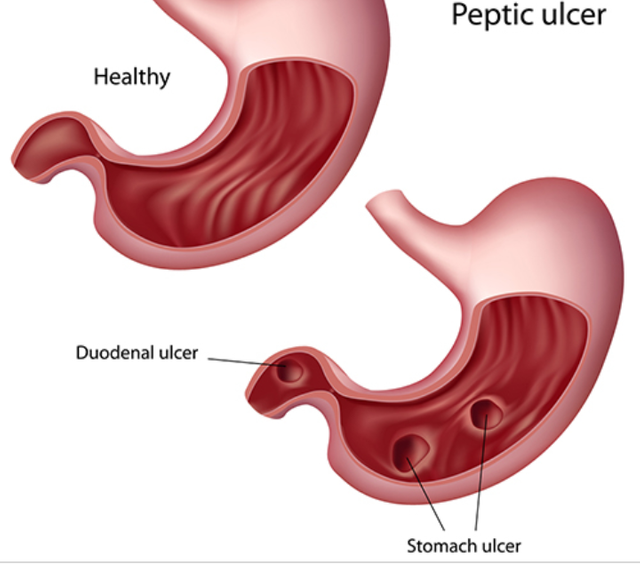What is ulcer?
Ulcer is a wound on a part of the body. Therefore, peptic ulcer as the name implies is a wound or sore by the stomach acid secretions on the lining of the oesophagus, stomach or small intestine.
Types of peptic ulcer
There are two major types of peptic ulcer
- Gastric ulcer
- Duodenal ulcer
Features of gastric ulcer
- occurs in the stomach
- abdominal pain can't be relieved by eating
- less likely to awaken patient in the night
- presents with melena (dark tarry stool) and haematemesis (bloody vomit) since it occurs at the upper gastrointestinal tract.
- epigastric pain 1-2 hours after eating
Features of duodenal ulcer
- occurs in the upper part of the small intestine (duodenum)
- abdominal pain can be relieved by eating
- often awakens patient at night
- presents with fresh blood in stool unlike gastric ulcer.
- epigastric pain 2-5 hours after eating
Causes of peptic ulcer
Ulcer is majorly caused by the bacteria Helicobacter pylori and long-term use of NSAIDS such as Ibuprofen
Risk factors
- History of peptic ulcer
- Lifestyle such as smoking and alcohol consumption.
Does stress and spicy food cause ulcer?
Answer is No. They only exacerbate the symptoms.

Image created by me on canva
The most common symptom is a dull or burning pain in your belly which usually occurs around meal time and may last from a few minutes to a few hours.
'' Other symptoms include '' JohnHopkins medicine
- burping
- nausea and vomiting which may contain blood
- anorexia
- weight loss and fatigue
- referred pain (i.e. pain that occurs in another location away from the main source of pain)
Management
This includes both conservative and pharmacological management.
Conservative management
- Lifestyle modification which includes quitting smoking and limiting alcohol/caffeine intake
- Protecting oneself from infections and early treatment.
- Not using NSAIDS (Non-steroidal anti-inflammatory drugs) such as aspirin and ibuprofen.
- Avoid certain foods ( fried and spicy foods, fruits/foods with high acidic and gas contents such as pineapple and cabbage.
So you may ask what kind of foods can i take then?
Foods such as yoghurt which contains probiotics, a good bacteria and fibre -rich foods such as apple and oatmeal which lowers the acid content in the stomach thereby easing bloating and pain are good for consumption
Pharmacological management
This ranges from the use of antibiotics, proton pump inhibitors eg. Omeprazole, H2- blockers eg. Cimetidine and Antacids.
Please avoid self-medications and visit the nearest hospital for quality medical care if symptom presents
Complications of peptic ulcer
- Bleeding
- Perforation
- Peritonitis - inflammation and infection of the abdominal cavity due to perforation
- Obstruction - narrowing and blocking as a result of scar tissues from the wound.
A major misconception: Milk heals ulcer
Many are of the opinion that milk heals ulcer but here is the right information below
it may soothe it for a few seconds but the condition worsens because milk itself increases the acidic content of the stomach. Thus, worsening the symptoms of peptic ulcer
Thanks for engaging in my post and i hope you learn a lot from it. See you all next time

Great article from you. Thanks so much for producing such a quality content in this community, you can add the #science tag your post so as to receive the curation support from the curation teams
Downvoting a post can decrease pending rewards and make it less visible. Common reasons:
Submit
Thanks a lot
Downvoting a post can decrease pending rewards and make it less visible. Common reasons:
Submit
And most at times gastric patients mostly take milk thanks for this educative post
Downvoting a post can decrease pending rewards and make it less visible. Common reasons:
Submit
Thanks for engaging.
Downvoting a post can decrease pending rewards and make it less visible. Common reasons:
Submit
Wow, wonderful information, and it's nice finding out about the misconception regarding milk healing ulcer. Even I thought that milk heals ulcer
Downvoting a post can decrease pending rewards and make it less visible. Common reasons:
Submit
Thanks for engaging. I thought so too a long time ago but we learn everyday you know
Downvoting a post can decrease pending rewards and make it less visible. Common reasons:
Submit